In a bold move shaking the foundations of mobile app commerce, Epic Games has unveiled its Webshops initiative, allowing iOS developers to offer out-of-app purchases directly to users. This development comes in the wake of a federal court ruling that found Apple in violation of a 2021 injunction mandating the allowance of alternative payment options outside its App Store.
Epic’s Webshops: A New Avenue for Developers
Starting June 2025, developers can establish Webshops hosted on the Epic Games Store. These Webshops enable users to make purchases outside the traditional in-app purchase system, effectively bypassing Apple’s standard 30% commission fee. Epic’s initiative aims to provide a more cost-effective solution for developers and consumers alike.
To incentivize this shift, Epic is offering a 0% revenue share on the first $1 million in revenue per app annually through its store. Beyond this threshold, the standard 88/12 revenue split applies. Additionally, users making purchases via Webshops will receive 5% back in Epic Rewards, usable for future transactions on the Epic Games Store.
Legal Backdrop: Apple’s Courtroom Setback
The introduction of Webshops is closely tied to a recent legal decision. U.S. District Judge Yvonne Gonzalez Rogers ruled that Apple had willfully violated a 2021 court order by imposing a 27% commission on out-of-app purchases and restricting developers from directing users to alternative payment methods. The judge criticized Apple’s actions as anti-competitive and referred the case for potential criminal investigation.
This ruling stemmed from Epic Games’ lawsuit against Apple, initiated in 2020 after Apple removed Fortnite from the App Store due to Epic’s implementation of a direct payment system within the app. The court’s decision mandates that Apple cease collecting fees on external purchases and allow developers to communicate freely with users about alternative payment options.
Implications for the App Ecosystem
Epic’s Webshops could significantly impact the app development landscape. By offering a platform that circumvents Apple’s commission structure, developers may find greater financial flexibility and control over their revenue streams. This move also aligns with broader regulatory trends advocating for increased competition and reduced gatekeeping in digital marketplaces.
For consumers, the introduction of Webshops may lead to more competitive pricing and diverse purchasing options. However, it remains to be seen how users will adapt to making purchases outside the familiar in-app environment.
Apple’s Response and Future Outlook
Apple has expressed disagreement with the court’s ruling and plans to appeal the decision. In the interim, the company has stated its intention to comply with the court’s mandates. The outcome of this legal battle could set a precedent for how digital marketplaces operate and how much control platform owners have over transactions within their ecosystems.
As the situation evolves, developers and consumers alike will be watching closely to see how these changes affect the dynamics of app distribution and monetization on iOS devices.




